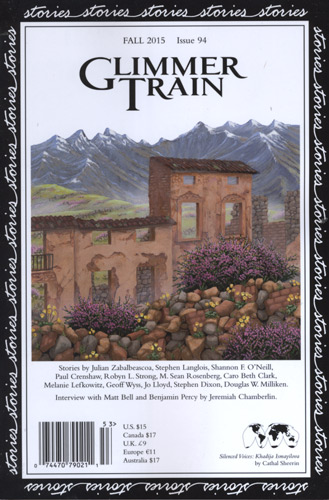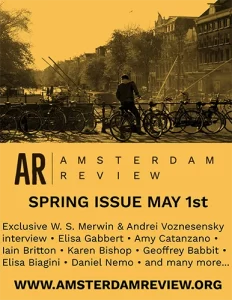Glimmer Train Stories – Fall 2015
The Fall 2015 issue of Glimmer Train Stories is a delightful showcase of short fiction from both new and established writers, packing twelve short stories, an interview, and a short essay in its 200+ pages. Whether there is an explicit theme is unknown, but the majority of the pieces have a couple of common threads, primarily youth and family. The Fall 2015 issue of Glimmer Train Stories is a delightful showcase of short fiction from both new and established writers, packing twelve short stories, an interview, and a short essay in its 200+ pages. Whether there is an explicit theme is unknown, but the majority of the pieces have a couple of common threads, primarily youth and family.
In “Uncle Jerry,” Stephen Langlois weaves a tale of a lone sister trying to hold a loose collection of five brothers together as a family, even if only for occasional dinners. Jerry, one of the brothers, is a drifter with a long-standing habit of disappearing for days at a time, possibly under the throes of addiction and/or mental illness. Told from the point of view of the woman’s daughter, Tara, a halfhearted attempt is made to get Jerry a job at the grocery store where Tara works until she begins to regret the decision and with it, her newfound sense of responsibility for him, eventually priming Jerry for failure. But when Jerry disappears once again and Tara’s disabled mother is hospitalized, Tara takes on the task of searching for him in dive bars, greasy spoons, and vacant buildings.
In Paul Crenshaw’s “Uniform,” what begins as a small group of students honoring their fallen and wounded relatives by wearing their uniforms to school becomes a surreal episode of ad hoc soldiery. As their hunger for discipline and order intensifies, they march into the dark, wild Appalachians, accompanied by a local reporter who is investigating the students and their unspecified mission. This is an original, compelling take on patriotism, grief, and the effects of war casualties on the families left behind.
Matt Bell and Benjamin Percy are featured in this issue’s interview, conducted by Jeremiah Chamberlin. The two subjects discuss their literary roots and what inspired them to begin (and maintain) a regular writing habit, while detailing what those habits are. They also discuss how they inject new ideas into stories which contain familiar themes and their revamp of classic creatures such as werewolves, using the inspiration from past works to enhance their own creative output without descending into camp or cliché. Politicalization and editorializing in their fiction is also touched upon, requiring a literary balancing act due to the blowback received from readers who take such issues all too seriously as they respond to the authors in vitriolic emails.
One of my favorites in this first-class collection is a debut publication by 23-year-old Robyn L. Strong, “Rhomboifungdombobumblagroofscurrlaliadiscoprulate.” This imaginative story is told in the point of view of a long-term inmate in a mental health facility who has been rejected from her family over the course of her seven-year stay. As the character prepares to leave the facility and enter a world she barely knows, it’s not exactly clear that she will be equipped to survive, summoning a sympathetic reaction for a character who reveals little background information. The exact reason why she is there is not revealed, but her family’s rejection hints at something traumatic. With journalistic intimacy, the protagonist wrestles with a fuzzy mind under a cocktail of various psychotropic medications, blurring the line between reality and her own mental illness. Even without a detailed background, a sadness runs through the prose as she tries to get her mind straight amid the stale institutional setting and her own arrested development. The narrative risks this young author takes belies her age and experience, creating an exciting, fresh perspective that leaves a reader eager to see more from her in the future.
“The Kind I Really Am” is another first publication, this one by Caro Beth Clark, treading the line between dramatic quirk and comedic narrative. As events unfold, characters are called to make adult decisions. It becomes apparent that the protagonist is unable to function in such a manner, kept at arm’s length by wealthy parents and held back by her own dysfunction. It leaves the reader wondering if she can even tackle events like neighborhood gentrification and a squirrel infestation.
“The Dissimulator” by Geoff Wyss pits a liberal couple against a conservative high school friend who graciously opens his Mississippi home to them after they are displaced by a bad storm in their New Orleans home. Tension and conflict hang over the story like the sword of Damocles but the blade is held back by the characters’ humanity as their flaws are uncovered during a visit to a strip club.
Readers familiar with this long-running periodical will not be disappointed in the quality of this latest batch of short fiction, while newcomers will find several examples of well-crafted, compelling stories to sift through. There is a little something here for everyone who enjoys the short form, and the generous mix of new writers along with more seasoned authors provide several levels of satisfaction for both casual and serious readers.
[www.glimmertrain.com]





